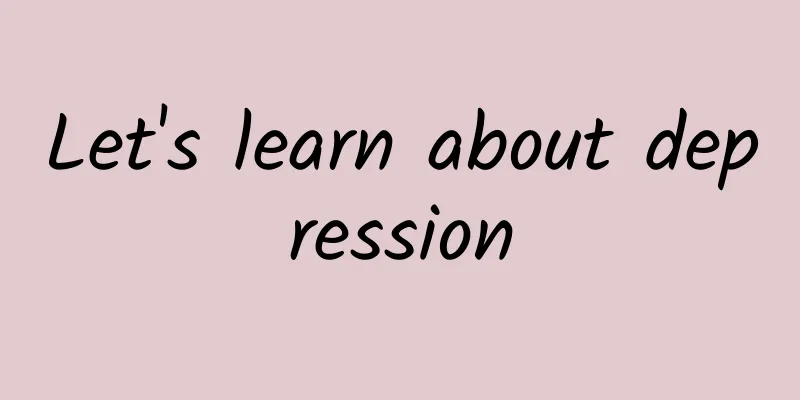Let's learn about depression

|
This is the 4053th article of Da Yi Xiao Hu In daily life, do you often hear people say, "I've been in a bad mood recently, am I suffering from depression?", "People with depression are pretentious, narrow-minded, and can't think straight when encountering problems." Or "Depression does not need treatment, just find a friend to talk to...", these are misunderstandings about depression. Let's talk about depression today. After encountering difficulties and setbacks, people usually feel sad, frustrated, and even sad, but this emotion usually does not last too long. Most people can quickly get out of this emotional distress and return to normal life. This situation is usually depression. Depression is not the same as depression. Depression is very common in daily life and lasts for a short time. It will not have a significant impact on social functions. But there are also some people who continue to feel low, sad, unhappy, tired, energy and physical strength decline, lose interest, feel unhappy, can't concentrate, can't study, don't want to work, don't want to see people, and even pessimistic and want to leave this world. This may be a manifestation of depression. Depression is a disease that lasts for more than two weeks. It will affect social functions such as study and work and requires professional help. The cause of depression is very complex, and is the result of the complex interweaving and interaction of social and psychological factors and biological factors. There are three main neurotransmitters in the brain: norepinephrine, serotonin, and dopamine, which play an important role in the onset of depression; genetic studies have shown that the onset of depression is closely related to individual genetic quality; psychosocial factors also play an important role in the onset of depression, such as widowhood, divorce, unemployment, academic setbacks, poor economic conditions, illness and other negative events, which can lead to the occurrence of depression; individuals with adverse experiences in childhood and obvious personality traits such as anxiety, compulsion, and impulsivity are prone to depression. According to data disclosed by the World Health Organization, more than 350 million people suffer from depression worldwide, with about 95 million in my country. The lifetime prevalence of depressive disorders is 6.8%, with a higher incidence in women than in men, accounting for 65% of patients with depression. According to relevant data from the World Health Organization, the number of people suffering from depression and anxiety disorders has increased significantly worldwide since 2020, with a surge of 53 million people with depression, an increase of 27.6%, and a surge of 62 million people with anxiety disorders, an increase of 20.8%. Depression is one of the common mental disorders, and its main clinical manifestations include core symptoms and other related symptoms, among which the core symptoms are mainly low mood, loss of interest and lack of energy. Other symptoms are cognitive, physiological and behavioral symptoms that appear on the basis of low mood. Such as inattention, insomnia, slow reaction, reduced behavioral activity and fatigue. Let's take a look at depression from the aspects of emotional, physical, behavioral and cognitive symptoms. 01 Emotional symptoms Affective symptoms are the main manifestations of depression, including low mood that is felt by oneself or observable by others, inability to be happy, decreased or even loss of interest, inability to experience happiness, and even inexplicable sadness. Low mood exists almost every day and generally does not improve with changes in the environment. However, characteristic diurnal changes may occur within a day (heavier during the day and lighter at night). Some patients also experience anxiety, pain, motor agitation, "confused", restless, and walking back and forth, which makes the inattention more prominent. Sometimes these experiences are more prominent than the depressed mood, and thus may mask the depressed mood, leading to missed diagnosis or misdiagnosis. 02 Physical symptoms Physical symptoms are not uncommon in many patients with depression, including abnormalities in weight, appetite, sleep, and behavioral activities. Foreign scholars call them biological symptoms, and typical manifestations include: loss of interest and pleasure in activities that are usually enjoyable; lack of emotional response to usually pleasant environments; worsening depression in the morning; presence of psychomotor retardation or agitation; waking up 2 hours or more earlier than usual in the morning; a significant decrease in appetite; weight loss of at least 5% in a month; and a significant decrease in libido. Usually, patients with moderate to severe or severe depression have 4 or more of the above physical symptoms. 03 Cognitive symptoms In severe depression, there is often a certain degree of cognitive impairment or damage. Many patients with depression will describe slow thinking, inattention, distraction, decreased information processing ability, and indifference to themselves and the surrounding environment. Generally speaking, some of these depressive cognitive impairments are transient, especially in terms of attention span, concentration, memory storage and reproduction. When the symptoms of depression are relieved, these cognitive impairments can return to pre-illness levels, but some cognitive impairment symptoms do not improve with the relief of depressive symptoms. It should be noted that the emotional symptoms of elderly patients with depression may be atypical, and cognitive impairment may be the main feature when they seek medical treatment. In severe cases, it may reach the level of dementia, which is easy to be misdiagnosed. Therefore, for patients with symptoms of dementia syndrome, it is necessary to carefully identify and treat potential depressive disorders. Patients with depressive disorders often also have the risk of negative world-weariness and suicide, which requires careful evaluation and prevention. Treatments for depression include medication, psychotherapy, physical therapy, rehabilitation therapy, etc. Depression is not terrible. Like most diseases, it is preventable and treatable. We can often examine and check our emotions and ask ourselves a few questions: Are you in a good mood recently? Are you stressed? If so, is it because of work, family life, or interpersonal relationships? Are there any stress reactions? I hope more people will understand depression, correctly understand and scientifically deal with this disease, detect and treat it early, actively seek professional help, and be the first person responsible for their own mental health! A large number of clinical practices have proved that cured patients can fully restore their social functions and see the rainbow of life again! Author: Changchun Sixth Hospital Sang HongChief Physician |
<<: eMarketer: US advertisers expected to spend $4.1 billion on paid social media ads in 2013
Recommend
What to do if your immunity is low after childbirth
Women should pay special attention to physical re...
What are the benefits of drinking peach blossom tea? Can peach blossom tea help you lose weight?
Peach blossom tea, as the name suggests, is made ...
How to regulate your period one week in advance
Many people experience menstrual syndrome and var...
Causes and treatments of high prolactin levels
Women in modern life must pay more attention to v...
Can drinking yogurt protect against computer radiation? Don’t exaggerate the claim…
Ruan Guangfeng Yogurt tastes sweet and sour and i...
What should I do if my vaginal discharge becomes brown?
Women's private parts are the weakest. Leucor...
Does eating chocolate help relieve menstrual cramps?
I believe that many people like to eat chocolate,...
Why do I catch a cold during my period?
We should all be familiar with menstruation in ou...
Things to note when you have your period at the age of eleven
In today's world where people have enough foo...
Side effects of cesarean section for second child
The second child means a second birth. Generally ...
What medicine should women take to treat insomnia during menopause
Key reminder: Nowadays, many women have trouble s...
How to make fried chicken nuggets crispy and crunchy? What is the best flour to use for fried chicken legs?
Fried chicken is a delicacy that is loved by both...
Is mild breast hyperplasia serious?
The problem of mild breast hyperplasia has always...
What is the reason for high white blood cell count in late pregnancy
We all know that there is a kind of cell in our b...









